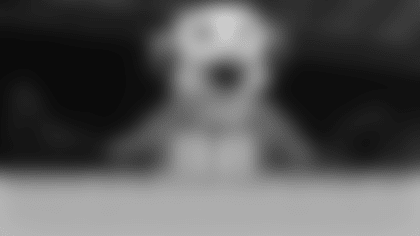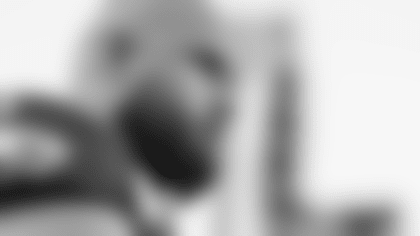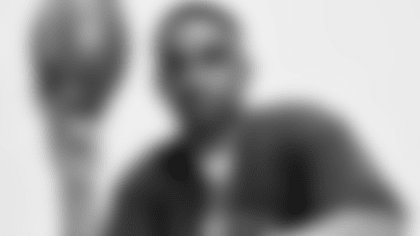Q. What's up with T Jason Peters today?
COACH KELLY: Jason will not practice today. He's still going through rehab for his back.
Q. How about QB Sam Bradford?
COACH KELLY: Sam has not been cleared through concussion protocol, so he will not go today.
Q. And RB Ryan Mathews?
COACH KELLY: Ryan has not been cleared through concussion protocol, and he won't go today either.
Q. How important is participation in the Thursday installation period to whether Bradford will be able to play on Sunday?
COACH KELLY: It's important to everybody. Our workdays during the week are Tuesday, Wednesday, Thursday, so it's an important day for everybody.
Q. Do you get the sense if there was a setback with Peters? He was practicing and now he isn't.
COACH KELLY: I don't know about a setback; I just know he's not going to go today. We'll monitor him as we go through the weekend.
Q. How did Peters look Tuesday when he was out here?
COACH KELLY: In the limited work he did, I think he looked okay.
Q. Are you worried that his condition could be something that hampers him for the rest of the year?
COACH KELLY: Not from what our trainers tell us, no.
Q. What are they telling you?
COACH KELLY: That he has a bad back and he can't practice today.
Q. In your time here, I believe WR Riley Cooper, before the Carolina game, is the only player who did not practice on the Wednesday or Thursday before a game, yet still played in the game on Sunday. Is it hard for guys that miss those days of practice to be able to play on Sundays?
COACH KELLY: It's all on an individual basis: 'Who is available? What's up, what's down?' So we deal with it on an individual basis. Obviously, if you don't practice, it sets you back a little bit because you don't get a chance to do things full speed in the game plan, but there is not a set rule that you have to do 'this' and 'this.' It just depends on everybody's individual situation.
Q. Did Mathews' concussion occur on his last carry of the game against Miami?
COACH KELLY: I don't know that. I haven't really spoken to them about when they think it occurred. I just know he hasn't been cleared yet. So I don't know specifically what play it happened on.
Q. When you say each individual is different, does it matter what position they play?
COACH KELLY: No, again, it's just you take it as it comes, and then make a decision based upon -- first off, they have to be cleared to play. So a lot of times you don't even spend time on it because they haven't been cleared. So doctors have to clear them to allow them to play, first. Then that is the first step and we go from there. So it's always done, depending on the situation, 'Where we are and what do we have? Can he go? Can he not go? What is his understanding of the game plan?' All that stuff.
Q. Why do you take a hand's off approach to your players' injuries?
COACH KELLY: Because I'm not a medical doctor. So I think it would be very foolish of me to say, 'Yeah, I don't think he has a concussion. Go back on the field.' That's kind of preposterous, I think.
Q. From what the trainers have told you, was Bradford able to do cardio or any weightlifting?
COACH KELLY: Sam is not lifting. He's not doing anything right now. He's just in meetings.
Q. Every team prioritizes taking care of and protecting the football. A couple years ago, Michael Vick credited you for helping him with that. Have techniques changed as far as the way guys hold and protect the ball or do guys just need to be reminded?
COACH KELLY: No, I think that's a basic fundamental. I think we've actually been pretty good from a fumble standpoint. I think we've done a good job on our ball security. Our interceptions are the things where a lot of times it's tips or bad decisions on the quarterback. There are a lot of different factors on an interception. But from a fumble standpoint, I think we've done a good job. But has the fundamental technique changed from the ball-security standpoint in terms of how to hold the football? No.
Q. Have you been given a diagnosis on Bradford's shoulder?
COACH KELLY: I have not had that. So the concussion is the No. 1 thing. He can't do anything until he's cleared from his concussion.
Q. Looking at the offensive line grouping that had G/T Dennis Kelly on the right side and T Lane Johnson on the left. In their first time out it seemed they held up pretty well and then last week they took a step back. Is there rhyme or reason for that?
COACH KELLY: No, again, I think sometimes the credit goes to who you're playing. I think the performance that [Dolphins DT] Ndamukong Suh had last Sunday was a factor in that. I think that's part of it. I think sometimes we always look at, 'How come this guy played so poorly?' Well [maybe it's], 'How come that guy played so well?' Sometimes you're playing against a really good player, and it was a tough matchup. We knew going into the game, he's the premier defensive tackle that we've faced so far this year. We're going to face another one this week and get another challenge this week in [Buccaneers DT Gerald] McCoy. But I think some of the credit goes to Suh in terms of what type of player he was. He was all the over the field, whether we were running nakeds running away from him or whether we were running the ball at him. He had a productive day. He chased us down. We threw a screen pass in the red zone to Ryan Mathews and he tackled Ryan Mathews 12 yards down the field on the third down. Suh was the one who was credited and rightly so. He had the tackle on the play. He was the right defensive tackle and it was a screen to the left. So I think a lot of it goes to the player.
Q. Do the Buccaneers run a lot of stunts and games up front?
COACH KELLY: I wouldn't say a lot. They're traditional in what they do. There is a percentage of it. I think [Buccaneers Head Coach Lovie Smith] is very systematic in what he does; Lovie is very disciplined in what he does. I think there is a certain percentage that he carries over whether he's in Chicago or Tampa Bay. So it's not a lot, but it's part of it. I'd say about 20 percent of it.
Q. You guys are at 32 percent on third down, which I would think is lower than you want to be. It's lower than you have been in the first two years. Any one thing or couple things that you point out with third downs?
COACH KELLY: The biggest thing for us on third down as you go through it is we're in too many third-and-longs, and they're more difficult to obviously convert than a third-and-medium and third-and-short. But a lot of that comes – especially early in the year when our numbers were down. We've been better recently, but it's because of our inefficiency on first and second down that leads you to being on third-and-longs. Those negative yardage plays that we've had, specifically I think when you get into the game last Sunday, it was the penalties. So now you're first and 10, we're thinking second and 6, 'What's the play call?' It's a penalty and now we're first and 20. So obviously, it's a little bit more difficult then because you're getting a little bit more third-and-longs than we've had in the past two years.
Q. In your first two years, you've had to change quarterbacks due to injuries. And obviously, while it speaks to having a capable back-up, what does it say about the continuity as far as having to do that during the season twice in the first two years?
COACH KELLY: Well, first off, it says we're unfortunate because we've had an injury, so we have to make that adjustment. But I think it says to our -- I think in this league, quarterbacks know, at least here they know and they should know, that you have an opportunity to play every single week in that position because of the injury rate with quarterbacks in the National Football League. So you have to prepare like you're the starter so that you're 'a chinstrap away' from having to go in the game and you better understand the game plan from that standpoint. It's a lot harder because you don't get as many reps. Obviously, the ones get a lot more reps than the twos and that's throughout the league in terms of how it is. But you still have to stay on top of your game from a game-plan standpoint. That is one thing about [QB] Mark [Sanchez] – his work ethic. He's in this building very late every night, he works extremely hard on the game plan, he prepares himself like he's going to be the starter whether he's named the starter going into that game or it occurs in the first quarter, second quarter or third quarter. When he goes in there, he has to be able to function in our offense, so we don't have to say, 'Hey, we have to throw this whole chunk of offense out. We just only can go with this small portion of it.' We're allowed to run, because of Mark's understanding of what we're doing, we can run everything that we have in our game plan that week.
Q. Do you study the injury rate for quarterbacks?
COACH KELLY: I don't have the specific number. But you can look around the league. There are a lot of guys. I know [Packers QB Aaron] Rodgers seems like he's banged up right now. [Texans QB Brian] Hoyer has a concussion right now. There are a lot of guys – bounce around the league. [Colts QB] Andrew Luck is out right now. There's always a handful of quarterbacks that get banged up and don't finish -- the guy that starts the season isn't the guy that plays all 16 games.
Q. What's involved in making a back-shoulder pass work between a receiver and a quarterback?
COACH KELLY: Location, timing, where's the defender. Obviously, if you have him beat clean, you're not throwing a back-shoulder pass. Kind of understanding where the defender is is important in terms of where you're throwing that, timing in terms of where the ball will be located, when to expect it when you're the receiver, how far down the field depending on the depth of the route that called. So there are a lot of intricacies to it. It's not just something they can work on their own because it depends on how the defender is covering them. It always has to be done in conjunction with a full-speed type of drill. You can throw them as much as you want on air, ut you don't know where the defender is and where you need to locate the football.
Q. So how they're being defended should decide whether the back shoulder is there or not?
COACH KELLY: Yeah, because obviously if I beat him clean off the line of scrimmage and the defensive back is behind me, I'm not going to throw back shoulder. I'm going to throw the ball over the top.
Q. What is your evaluation of Buccaneers WR Mike Evans and the way they use him?
COACH KELLY: He's a tough matchup. The first thing that jumps out at you, obviously we saw him coming out of college, is just how big he is. He looks like a basketball player. He's in the [Jets WR] Brandon Marshall, [Cowboys WR] Dez Bryant size, physicality-type thing. So he's one of those guys, and I think [Buccaneers QB] Jameis [Winston] seems like he's developed a comfort level with him that he's one of those guys that it looks like he's covered, but he may not be covered because you can throw it up and he can go get it. He's a vertical threat. He's got very good speed for someone that size. Sometimes when you get a guy that's that big, they're not a deep threat down the field. But he's obviously is a deep threat and is their number one target, and by far, he's the number one receiver that we have to – especially with [Buccaneers WR Vincent] Jackson being out recently and [Buccaneers TE Austin] Seferian-Jenkins being out recently, I think Jameis has really leaned on Evans. We have to know where he is. They line him up in multiple positions, so we have to know where he is at all times on the field.
Q. If you don't have Mathews this Sunday, what will that take from your lineup?
COACH KELLY: A running back that we'd use on kind of the same basis as [RB] DeMarco [Murray] in terms of getting them both in the game; not worrying about who is in there. You still have that tough, big, hard-nosed, physical running back. The other two running backs are obviously [RB Darren Sproles] Sprolesy, who is a different type of running back. We use a different approach when Darren's in the back field, and then [RB] Kenjon Barner would be up and be active on gameday.







